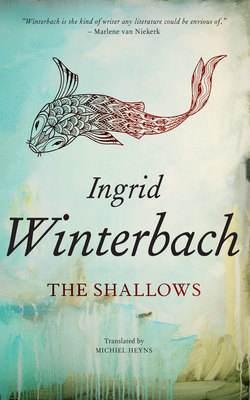Читать книгу The Shallows - Ingrid Winterbach - Страница 6
На сайте Литреса книга снята с продажи.
Three
ОглавлениеYour lover, and my beloved friend. You were speechless with grief, your cheeks cold as alabaster. A month or so later I packed my bags and left. I should have stayed, I should have stood by you, but if I stayed, I thought, I’d perish. After Jacobus’ death there was a short circuit in my head, I had to betake myself to some other environment, or perish.
We get together only at the beginning of the new year in the coffee shop, after your return from your long, extended travels. The coffee shop has a dark interior. How glad I am to see your dear face once again. I take your face in my two hands and I say: It’s been such a long while that we haven’t seen each other! We gaze into each other’s eyes long and feelingly. We sit down at a little corner table. Outside it’s been raining incessantly since the previous day. Now at last we’re both back in town, I say. You have no plans to leave again? No, I don’t have any such plans. And how do you find it, being back? you ask. I don’t know, I say. You know how ambivalent I am about the town. I had an aversion to the place for so long. I have it still, at times very intensely. Aversion or fear? you ask. Perhaps a bit of both. While I was away, I often thought that I didn’t want to come back.
The waitress brings our coffee. We are both silent for a while. How are you? I ask. You don’t reply immediately, keep your gaze lowered. Move a grain of sugar around on the table with your finger. Things have never been the same again, you say softly. Everything has changed subtly but inexorably. Not quite drowning, but with the solid ground caved in under your feet. Could it ever be different again – doesn’t time bring change? I ask; or so they say, in any case. Maybe, maybe not, you say, how would you know? At the moment it doesn’t feel as if it could ever be different again.
Again we fall silent, and listen to the rain falling gently but persistently. And your trip, I ask, did it make any difference? It provided temporary diversion, you say, though you sometimes think you should have stayed and faced out your grief. That could perhaps have hastened the healing process.
I’ve started writing a monograph on the Olivier brothers, I say. You’ve been planning to do it for a long time, you say. Yes, but it’s taken me a long time to get going, I say. There are few people in the coffee shop, the interior is dark, sound is muffled by the incessant rain outside. I hope to be granted an interview with the brothers’ father, with Marcus Olivier, but it’s not that easy.
We sit in silence for a while, listening to the rain. Drink our coffee. Then abruptly you look up and ask, what are you to do?
*
When we get up to leave, I feel slightly light-headed, whether with joy or dismay or general disorientation is not clear to me. We take our leave. I don’t feel young, I don’t feel old. It is high summer, in the streets the foliage is dense, the shadows sharp after the rain.
I am reading a book in which the deceased Fernando Pessoa visits one of his alter egos (and heteronyms), Ricardo Reis. Reis has recently moved into an apartment after his sojourn of more than two months in the Hotel Bragança, and this is his first night in his new abode; it’s cold, he’s hardly dropped off when somebody knocks. It’s Pessoa. Reis invites him in, they talk for a while, then Pessoa says Reis should lie down again, he doesn’t want to keep him from his sleep. Reis lies down, Pessoa tucks in the sheet over him as solicitously as a mother. Reis asks him to switch off the light. Initially the room is dark, then the light from outside seeps in through the chinks in the shutters. Reis closes his eyes and murmurs: Good night, Fernando. It seems to him as if it takes Pessoa quite a while to reply: Good night, Ricardo. Pessoa sits down on a chair in the room, crosses one leg over the other, places his hands on his knee. He is the very image of desolation. Reis wakes up in the middle of the night, the rain has stopped, the earth hurtles on through the utter silence of space. Pessoa is still sitting in the same place, in exactly the same posture, his face expressionless. Reis goes back to sleep. When he wakes up in the morning, Pessoa is no longer there. He must have left at first light.
Initially it rains incessantly in the city, Lisbon. A carnival festivity features a figure dressed in a tight black outfit with a skeleton painted on it in white. Dancing bones. At times I have a yen to dress myself in such a suit. On my bedside table is the skull of wire and white beads that I had made in the Eastern Cape by Zimbabweans. At night it keeps watch over me like Fernando Pessoa over his alter ego, Ricardo Reis.
